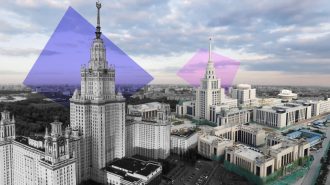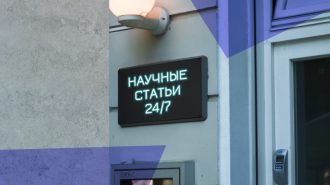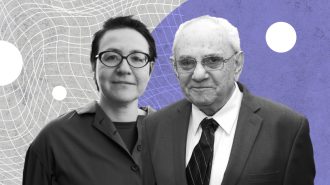In episode 16 of the podcast Invasion: Science in a Time of War, two scientists talk anonymously about how quickly one can become a "traitor to the motherland" for the leadership, how school principals are caught between the political hammer and the educational anvil, and how difficult it is to maintain relationships with colleagues who have left Russia. And also about how people who shared Ukraine's couch just yesterday got at the helm of higher education.
The sixteenth essay in the series “Creators” is dedicated to Evgenia Maksimovna Hanfmann, an outstanding psychologist, professor at Brandeis University. She was born in St. Petersburg, studied in Germany, worked in the USA, where she made a career in research and psychotherapy. Together with RASA (Russian-American Science Association) T-invariant continues publishing the series of biographical essays "Creators".
The Novosibirsk prosecutor's office has come up with such a way of correcting physicist Oleg Kabov, a corresponding member of the Russian Academy of Sciences. The prosecution asked for seven years in a general regime colony , a fine in the amount of his salary for three years, a restriction on leaving his place of residence and a three-year ban on scientific activity.
In episode 15 of the podcast Invasion: Science in a Time of War, two scientists anonymously reveal that they consider both those who left and those who continue to work in Russian universities to be martyrs, and that it is no longer possible to be "ironically silent" about the NWO. They also tell us how students today are forbidden to deal with acute social topics, but are forced to study the question of "why young people join youth movements".
T-invariant has repeatedly described how the Ministry of Education and Science and the leadership of the Russian Academy of Sciences are destroying the Institute for Information Transmission Problems (IPPI RAS). The demonstrative cancellation of the contract with the head of the institute, Andrei Sobolevsky, ignoring the opinion of scientists, led to a conflict between the scientific staff and the new directorate, the departure of a number of employees to MIPT, and the appointment of Dmitry Repin, a scientist with a dubious reputation, as deputy director. The Academic Council of IPPI has recently been headed by Dissertnet members.
"The tail is a very useful thing and modern man could use it". Alexander Markov and Olga Orlova discuss the evolutionary meaning of tail loss in episode 14 of the CounterEvolution podcast.
The Innopraktika Foundation of Vladimir Putin's daughter, Katerina Tikhonova, has made a number of statements about its readiness to gather development institutions into "one perimeter". The public speaker to promote these initiatives was Tikhonova's friend Natalia Popova, a former photo model and now the first deputy general director of Innopraktika. Over the past few years, Popova has been lobbying for Innopraktika's interests in Africa and the BRICS countries, and probably wants to continue the reform of development institutions that began in 2020 but was interrupted.
An international team of scientists analysed 1,378 stories in the world's leading media about casualties of the war in Gaza. It turned out that 85 per cent of these publications did not distinguish between fighters and civilians, and 95 per cent used data provided by the Gaza Ministry of Health, which is run by Hamas. Why are reputable publications using inaccurate information and what can Israel do to counter this? T-invariant spoke to the initiator of the study - sociologist Tatiana Gleser.
The ETH Zurich has adopted new security rules that effectively make it impossible for Russian students to enrol in the university's master's and doctoral programmes. T-invariant managed to speak to students who have lost the opportunity to study at this prestigious institution and to take comments from the ETH itself.
An international team of scientists analysed 1,371 reports of Gaza war casualties and found that the information circulated by the world's leading media outlets was falsified. In episode 15 of the Invasion: Science in a Time of War podcast, we speak with the initiator of this study, sociologist Tatiana Glaser.
In November 2024, the Prosecutor General's Office of the Russian Federation recognized the International Association of Intellectual Games (IAIG) as an undesirable organization. This absurd, at first glance, decision was preceded by a long history of ethical transformation and split of the once united intellectual community. Today, this confrontation looks like it was caused by a war, and everyone writes about it. However, it is based on deep contradictions and psychological deformations that have been embedded since Soviet times.
The redistribution of the market for the publication and distribution of academic scientific journals has led not only to serious delays in the publication of scientists' works, but also to Russia's self-isolation in the global market of scientific periodicals. By the beginning of December 2024, almost 75% of Russian academic scientific journals have not gone to press on time. This is the price of striving to publish scientific journals with a "Russian identity" and without foreign influence. T-invariant tells us what has already happened to Russian scientific periodicals and what else may happen to them.
The fifteenth essay in the series "Creators" is dedicated to Georgy Gamov, an outstanding physicist and cosmologist, professor at George Washington University and the University of Colorado at Boulder, who made a huge contribution to nuclear physics, cosmology and theoretical biology. Together with RASA (Russian-American Science Association) T-invariant continues publishing the series of biographical essays "Creators".
Current demographic dynamics suggest radical changes around the world. Fertility will fall everywhere, but the main problems are not related to this, but to uneven population growth in different countries. Scientists predict a huge increase in the proportion of Africans by 2100 and a marked depopulation of Europe and North America. Alexander Markov and Olga Orlova discuss the main demographic shocks in the 10th episode of the CounterEvolution podcast.
Today one can hear more and more often that Russia in the coming decades will live under "eternal Putin". The political regime is stable, the economy shows stability. Will the country turn into the USSR 2.0 or into an "orthodox Iran"? Are there prerequisites for regime change in Russia? T-invariant spoke to Andrei Yakovlev, a well-known economist and associate researcher at the Davis Centre at Harvard University.
Viktor Sadovnichy, the 85-year-old rector of Moscow State University, has been reappointed for a seventh term. This is not quite a typical situation: today the average age of a rector is under 60. T-invariant has studied the biographies of the heads of Russian universities in detail and realised that the problem with the rector corps is different: it is remarkably monotonous, as if they have specially selected people according to the average statistical pattern. Both the rector of Moscow State University and the heads of unremarkable regional universities have similar biographies and typical careers.
on 30 November 2024, the five-year agreement between the European Organisation for Nuclear Research (CERN) and the Russian Federation will end. T-invariant recalls how dramatically CERN and Russia have severed their relations over the past years and publishes an interview with a witness to these events - scientist Andrei Seriakov from St Petersburg.
Russian philosopher Mikhail Bakhtin explored carnival and laughter culture in the stagnant years of the late Soviet Union and called such topics "material-bodily bottom. Half a century later, anthropologists held a conference about excrement in St Petersburg entitled Anthropopology: Brown Studies and the Unclean Turn.
St. Petersburg State University was the first Russian university to ban its employees from publishing in international open access journals published by Elsevier. There are good reasons for this: as Elsevier told T-invarinat, the funds received from Russian authors are indeed sent to Ukraine.
Could humans have done without religion in their development? Apparently not. Whatever the genesis of religious consciousness, our mind is so organised that belief in the supernatural, omens, fortune-telling, and spirits is almost inevitable. Alexander Markov, Doctor of Biological Sciences, talks about this in episode 12 of the CounterEvolution podcast.
Approximately 4% of the world's people suffer from depressive disorder, and this figure is higher in women than in men. In the past, doctors used to call it melancholia and could not find a universal treatment. Now they have learnt to cope with depression quite well. And thank God, says Doctor of Biological Sciences Alexander Markov. This is the 11th episode of the CounterEvolution podcast.
One of the winners of the George Gamow Prize this year was Ekaterina Zhuravskaya, a professor at the Paris School of Economics. In an interview with T-invariant, she told how modern economic science works, whether it is possible to evaluate the results of sanctions and what studies of Goebbels' propaganda can tell us about the current military mobilization of Russian society.
"The Troitsk excavation under threat", "The last chance to learn our history", "Archaeologists ask for help " - only a small part of the publications that appeared this autumn. Fears of losing ancient Novgorod literatures are connected with the construction of the historical and archaeological centre, which is due to start this year.
In episode 13 of the podcast "Invasion: Science in a Time of War", two scientists anonymously talk about how it is possible to meet fellow travellers at the "Noon Against Putin" rally even in an Orthodox church, why professors fear denunciations from students, and how to maintain a rigorous professional level when Russian social sciences and humanities have been set back twenty years.
In episode 12 of the podcast Invasion: Science in a Time of War, two scientists talk anonymously about how hard it is to leave Russia, how internal emigration helps them keep their sanity, why they can no longer discuss the war with colleagues, the difficulty of understanding the true position of the leadership, and what they think about the turn of Russian science to the East.
The fourteenth essay from the series "Creators" is dedicated to Mikhail Ivanovich Rostovtsev, an outstanding archaeologist and historian of Antiquity, professor at St. Petersburg University and professor at Yale University, who made a huge contribution to historical science. Together with RASA (Russian-American Science Association), T-invariant continues publishing the series of biographical essays "Creators"
Recently, American scientist Sam Payne received a review of his own article published three years earlier, but now its authors were five employees of Sechenov University. So the world scientific community learnt about the Russian company "International Publisher", which is engaged in the production of fake scientific articles and places them for money in major foreign journals. More details - in the material T-invariant.
The problems of various countries, including Russia, Ukraine, Israel, the USA and China, are part of the global agenda of the future of humanity, including technological and humanistic issues that are being revised today and worry many of us. About the new "dispute of physicists and lyricists" in the context of the Sakharov paradigm "Peace, progress, human rights" - in the column of the professor of the University of North Carolina Alexander Kabanov.
The Russian-American Association of Scholars has announced the names of the winners of the prize, which is awarded to members of the Russian-speaking scientific diaspora. This year they were Professor Ekaterina Zhuravskaya of the Paris School of Economics and Professor Vladimir Vapnik of Columbia University.
The thirteenth essay from the series “Creators” is dedicated to Michael Stroukoff , an engineer, architect and aircraft designer who built both the famous knowledge in Washington and one of the most famous planes of the Vietnam War. Together with RASA (Russian-American Science Association) T-invariant continues publishing the series of biographical essays "Creators".
A recent article by a group of American professors on the introduction of DEI into university practice in the United States has caused a wide resonance. To what extent can DEI be considered a purely American phenomenon, and to what extent has it been assimilated by academic communities in other countries? Germany is a curious example. This is the subject of an article prepared for T-invariant by Alexander Libman, Doctor of Economics, Professor of Russian and East European Politics at the Free University of Berlin.
Moscow State University has announced the creation of the "world's second or third most powerful" supercomputer, having purchased components for it through a Chinese firm trading on AliExpress. T-invariant tells us how, under conditions of total sanctions on Sparrow Hills, they managed to assemble a classified computing complex and what Vladimir Putin's daughter Katerina Tikhonova and her Institute of Artificial Intelligence have to do with it.
As of 30 November, Russian scientists will no longer have access to the facilities of the European Organisation for Nuclear Research. This is not the only scientific instrument to which access has been closed due to Russia's invasion of Ukraine. T-invariant takes the example of the European XFEL free electron laser to understand what this means for science and what scientists who have lost access to this state-of-the-art research method are doing.
In early September, it became known that Dmitry Repin, who previously held the position of Advisor to the Rector of the Russian Academy of National Economy and Public Administration, was appointed Acting Deputy Director of IPPI RAS. The appointment took place against the background of the ongoing public conflict between the scientific staff of the institute and the recently appointed acting director of IPPI Maxim Fedorov. T-invariant tells what is known about the new administrator of the institute.
Students of the "School of District Anti-Corruption" together with Groza and T-Invariant studied the composition of expert councils at the Ministry of Education and Science of the Russian Federation. It turned out that more than 10 per cent of the experts who influence decision-making "on the most important issues of the ministry's activities" are plagiarists and violators of academic ethics.
In the Kara Sea, for the second week now, a drama has been developing around the research vessel “Akademik Nikolay Strakhov”, which is stuck there. T-invariant describes the broad context of the problem and tells what role Mikhail Kovalchuk can play in the emergency, who tried in the summer to bring the Institute of Oceanology of the Russian Academy of Sciences into the structure of his Kurchatov Center.
How do universities in exile try to preserve academic freedoms for those who have lost them? Why and at what point does the idea of boycotts of universities begin to contradict academic freedoms? T-invariant spoke to Dmitry Dubrovsky, PhD in History, Professor at the Free University.
Since September 1, a number of Russian universities have begun training "information warfare specialists". Such programs were "tested" even before the full-scale invasion, but this year there have been significantly more of them. T-invariant found out which universities have such programs and who will teach students propaganda.
The internal German resistance to the National Socialist dictatorship is a phenomenon that is not well known to anyone other than specialists. Nevertheless, there were many hotbeds of such struggle. T-invariant tells the story of a group of scientists and teachers who united around professors from the University of Freiburg. Its members worked closely with other German resistance groups and, despite the risk of exposure and threats to their lives, remained true to their professional and civic duty.








































